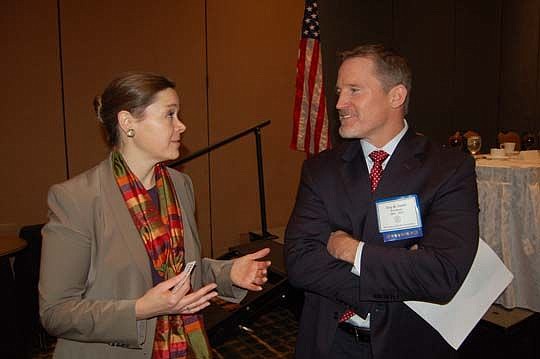
Survivors of human trafficking need basic necessities such as housing, food, security and safety, but that’s not all.
“They also need lawyers,” said Martina Vandenberg, an advocate for victims of human trafficking.
Formerly an attorney in private practice who specialized in commercial litigation and white collar criminal defense, Vandenberg established the Human Trafficking Pro Bono Legal Center in 2012. Based in Falls Church, Va., near Washington, D.C., the center also has offices in Baltimore and Houston.
Addressing members of The Jacksonville Bar Association on Thursday, Vandenberg said being represented by an attorney can change a human trafficking victim’s life.
She said most victims of trafficking are involved in the sex trade or in forced labor. When law enforcement agencies rescue a victim, prosecutors represent the state while victims often have no representation, which puts them at a disadvantage and often leads to less than satisfactory results.
Vandenberg cited a case in Brookline, Mass., in which a woman was brought to America and moved into the home of two attorneys where she was forced to work as a live-in servant for 19 years.
The woman thought she was working to make money to bring the rest of her family to America. When her “employers” were prosecuted, it was discovered they had paid the woman a total of $18,000 during the entire time she was in the home.
Vandenberg said the victim was represented in court by an attorney and was awarded more than $900,000 in back wages under federal law that mandates restitution.
In another case, a child was forced to work in a home, live in the garage and sleep on a bare mattress. A next-door neighbor wondered why the child wasn’t in school and contacted authorities.
When the case went to trial, the victim was not represented by an attorney, so when she was awarded restitution by the court, the money was not placed in trust. The child subsequently was adopted and the money was withdrawn by the parents for their own use, Vandenberg said.
Pro bono representation is particularly needed for expungement proceedings. Thousands of children were convicted of prostitution over the years before it was established under federal law that no one under 18 years of age can consent to a commercial sex crime. Some victims have criminal records for prostitution in as many as 12 states.
“Too often, children were arrested. The term ‘child prostitute’ is no longer used. They are victims of human trafficking,” said Vandenberg.
Vandenberg encourages all law firms to maintain a pro bono human trafficking practice group.
“The door is open for all of you to do this work,” she said to the room full of attorneys and judges. “It’s about putting the powerful people – and that’s you – on the side of trafficking victims.”
@DRMaxDowntown
(904) 356-2466